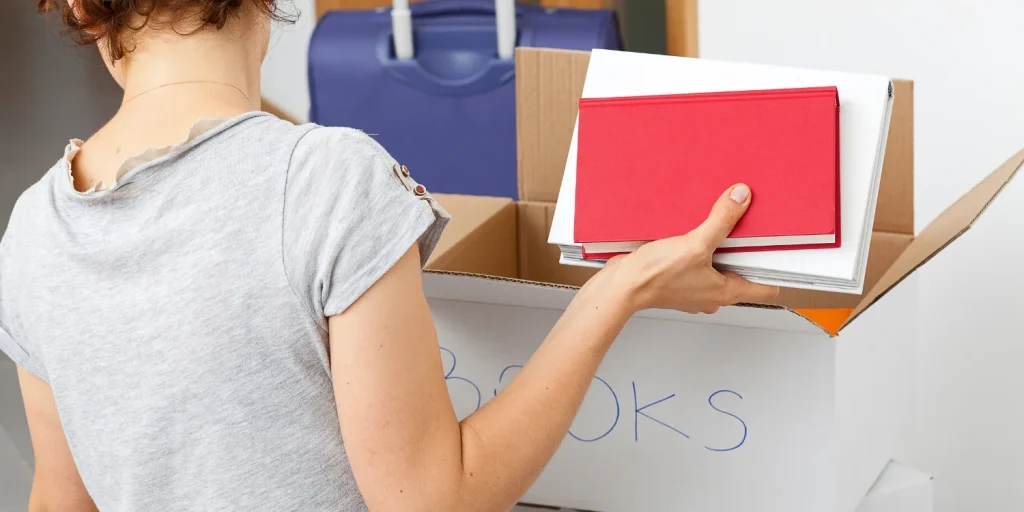Books are more than just pages—they often carry sentimental value, represent investments, or are cherished collectibles. Improper packing can lead to torn spines, bent pages, or damage from moisture. Since books are also heavy, poorly packed boxes can easily tear or become unsafe to move. Packing books correctly ensures they arrive at your new home in pristine condition, makes unpacking easier, and reduces the stress of moving day.
With the right techniques, you can keep your collection safe while making the process manageable.
Gather the Right Supplies
Having the right supplies is crucial for packing books securely and efficiently. Here’s what you’ll need:
- Small, Sturdy Boxes: Books are heavy, so small boxes are ideal to prevent overloading. They’re easier to carry and less likely to tear under weight.
- Packing Tape: Reinforce the seams of your boxes with strong packing tape to ensure they hold up during move.
- Packing Paper or Bubble Wrap: Use packing paper or bubble wrap to cushion books, protect delicate covers, and fill gaps inside the box to prevent shifting.
- Markers for Labeling: Clearly label each box with its contents and the destination room. Adding labels like "Heavy" can also help movers handle boxes with care.
- Optional - Rolling Suitcases: For smaller collections or convenience, pack books in a rolling suitcase. It’s a practical alternative that eliminates heavy lifting.
Sort and Declutter Your Book Collection
Before packing your books, take the opportunity to declutter your collection. Moving is the perfect time to evaluate which books you truly want to keep and which can find a new home.
Evaluate Your Books
Go through your books one by one and categorize them:
- Keep: Books with sentimental value, ongoing use, or collectible status.
- Sell: Rare, gently used, or valuable books you no longer need.
- Donate: Books in good condition that could benefit schools, libraries, or charities.
- Recycle: Damaged or outdated books that are no longer usable.
Options for Unwanted Books
- Donate to Libraries or Charities: Organizations like libraries, schools, and community centers often welcome book donations.
- Sell at a Yard Sale or Online: Earn a little extra cash by selling books at a yard sale, local secondhand shop, or platforms like eBay or Facebook Marketplace.
- Gift to Friends or Family: Share beloved books with those who will appreciate them.
Organize Books by Size and Type
Grouping your books by size and type before packing can make the process more efficient and help protect your collection during the move.
Group by Size
- Large Books: Place oversized or coffee-table books together. These should go in sturdy boxes to support their weight and prevent bending.
- Medium Books: Gather similarly sized books, such as hardcover novels or textbooks, to maximize box space.
- Small Books: Paperbacks and smaller books can be packed together to fill smaller gaps in boxes without adding excessive weight.
Separate Holy or Antique Books
Set aside Holy, sentimental, or antique books, such as first editions or leather-bound volumes. Wrap these in bubble wrap or packing paper for extra protection, and pack them in a separate, well-cushioned box.
Prepare Boxes for Packing
Properly preparing your boxes is essential to ensure they can handle the weight of books and provide adequate protection during the move.
Reinforce the Bottom of Boxes
Books are heavy, and a weak box bottom can give way under pressure. Use strong packing tape to reinforce the bottom of each box. Apply multiple layers along the seams and across the center for extra durability.
Line Boxes with Packing Paper
Before placing any books inside, line the bottom of the box with packing paper or bubble wrap. This provides a cushion that absorbs shocks during move and protects the books from scratches or other damage.
Use Smaller Boxes
Opt for small to medium-sized boxes to prevent overloading. A smaller box not only ensures the books are easier to carry but also reduces the risk of the box breaking due to excessive weight. Aim to keep each box under 30 pounds for safe handling.
How to Pack Books Safely
Packing your books safely ensures they stay intact and organized during the move. Follow these steps to protect your collection:
Heavier Books First
Place the heaviest books at the bottom of the box to create a stable base. This prevents lighter books from being crushed and helps balance the box for easier handling.
Packing Methods
- Lay Books Flat on Their Backs: Stack books flat to avoid bending or warping their spines. This method works best for hardcover or large books.
- Stand Books Upright: Place books upright with their spines against the box walls, similar to how they sit on a shelf. This arrangement minimizes damage to the covers and keeps the books stable.
- Wrap Delicate or Rare Books: For fragile, valuable, or sentimental books, wrap them individually with bubble wrap or packing paper. This provides an extra layer of protection against bumps and moisture.
Fill Gaps
Use packing paper or soft materials like clothing to fill empty spaces in the box. This prevents movement and reduces the risk of books shifting and getting damaged during move.
Label and Load Boxes
Proper labeling and careful loading are essential for an organized and damage-free move. Here’s how to handle your book boxes effectively:
Clearly Label Boxes
- Use a marker to label each box with its contents, such as "Books – Fiction" or "Books – Office."
- Include the destination room, like "Living Room" or "Office," to make unpacking more efficient.
- Adding specific labels helps movers know exactly where to place the boxes in your new home.
Add "Heavy" or "Fragile" Labels
- Clearly mark "Heavy" on book boxes to alert movers to handle with care.
- If a box contains delicate or valuable books, include a "Fragile" label for extra attention.
Load Boxes Carefully
- Place book boxes at the bottom of the moving truck to create a stable base.
- Avoid stacking heavier items on top of book boxes to prevent crushing.
- Ensure the boxes are snugly fit together to minimize movement during move.
Tips for Long-Term Book Storage
If you plan to store your books for an extended period, take precautions to protect them from environmental damage:
- Choose Climate-Controlled Spaces: Books are sensitive to humidity and temperature changes. Store them in a space with stable conditions to avoid mold, warping, or yellowing.
- Avoid Plastic Bags: While plastic may seem protective, it can trap moisture and lead to mold growth. Use acid-free paper to wrap books instead.
- Elevate Boxes: Place boxes on pallets or shelves to protect them from water damage caused by spills or flooding.
Proper storage keeps your books in pristine condition, even during long-term periods.
Bonus Tips for Book Lovers
For avid readers and collectors, here are two additional tips to simplify the moving process:
- Use Rolling Suitcases: For larger collections, pack books in sturdy rolling suitcases. They’re durable, easy to maneuver, and save you from heavy lifting.
- Keep Must-Read Books Accessible: Set aside a small selection of books to read during the move or after arriving at your new home. Pack these in a separate, easy-to-access bag or box.
Unpacking and Organizing Your Books
Once you’ve arrived at your new home, unpacking and organizing your books can be one of the most satisfying parts of settling in. Here’s how to do it efficiently:
Unpack Boxes First
Start by unpacking your book boxes early in the process. This will free up space and reduce clutter in your new home, making it easier to arrange furniture and other items.
Arrange Books on Shelves
- By Category: Group books into categories like fiction, nonfiction, cookbooks, or children’s books for easy access.
- By Size: Align books of similar sizes to create a visually appealing and stable arrangement.
- By Personal Preference: Organize based on what matters most to you, such as alphabetical order, color coordination, or frequently read titles.
Consider Professional Help for Large Collections
If you own an extensive or rare book collection, it’s wise to consider hiring professional packers and movers to ensure safe handling and relocation. Here’s why:
Expert Handling
Chicago Packers and Movers are trained to pack and relocate heavy and antique items like books. They use specialized materials and techniques to prevent damage to delicate covers and bindings.
Efficient Relocation
With professional help, you can rest assured that your collection will be moved efficiently and securely, saving you time and effort.
Insurance Coverage
Most professional moving companies offer insurance, providing added peace of mind for rare or valuable books.
Custom Solutions
For particularly rare or large collections, movers can provide custom crates or climate-controlled relocation to ensure your books remain in pristine condition.
Conclusion
Packing books for a move may seem daunting, but with the right approach, it can be manageable and stress-free. By decluttering your collection, using the proper supplies, and following safe packing techniques, you can protect your books from damage and make unpacking a breeze. For larger collections or rare items, professional help adds an extra layer of security. Whether you’re moving across town or across the country, these steps ensure your treasured books arrive safely, ready to be enjoyed in your new home.

